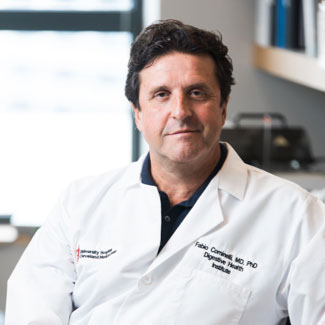IBD Research Update from the University Hospitals Digestive Health Institute
December 13, 2021
Innovations in Digestive Health | Fall 2021
Crohn’s Disease (CD) and Inflammatory Bowel Disease (IBD) are debilitating conditions of unclear origin. Current medical interventions only help patients manage their symptoms.
 Fabio Cominelli, MD, PhD
Fabio Cominelli, MD, PhD“The University Hospitals Digestive Health Institute (DHI) has a very strong basic research program to better understand the etiology of these diseases, to identify potential novel therapies and to support training for medical students and post-doctoral fellows interested in pursuing digestive health research,” says Fabio Cominelli, MD, PhD, Chief Scientific Officer, UH Digestive Health Institute.
Crohn’s disease research
Crohn’s Disease affects more than 1 million individuals in the United States. UH is engaged in both basic CD research and in the training and development of new investigators.
Although the exact cause of CD is still not well understood, evidence suggests the disease may be triggered by a dysregulated innate immune response in genetically susceptible hosts. A P01 grant supports research efforts at UH to define the role of innate immunity in experimental CD.
“Our multidisciplinary team seeks to understand the important pathogenic mechanisms of innate immunity, which we hope will help us develop new therapeutic modalities from the bench,” Dr. Cominelli says.
Currently, none of the available therapeutics for CD are curative and many have significant side effects. Digestive health experts hypothesize that dietary fat alters the commensal flora in patients with CD. The DHI also participates in an R01-funded grant to study mechanisms of experimental Crohn’s Disease.
“The gut microbiome is a hot area in gastrointestinal research,” says Dr. Cominelli. “The objective of this study is to understand how different types of dietary fat alter the gut flora and to evaluate the outcomes of dietary interventions. Some dietary fats suppress proinflammatory bacteria; others enhance the anti-inflammatory effects of commensal probiotics.”
Inflammatory bowel disease research
More than 3.2 million people in the U.S. suffer from IBD. Researchers suspect that cytokines play a role in intestinal flora, so the development of anti-cytokine treatments may be an effective treatment for IBD. A long-term R01 grant continues to fund a study that explores the role of cytokines in IBD, and has helped develop new therapies. Current research emphasizes novel cytokines, such as TL1A and IL-33.
Training the next generation of primary investigators
University Hospitals is committed to furthering digestive health research by developing and investing in interested medical professionals.
To this end, the Cleveland Digestive Diseases Research Core Center (DDRCC), a multi-institutional, collaborative effort between Case Western Reserve University (CWRU), University Hospitals, Cleveland Clinic Foundation and the Louis Stokes VA Medical Center, strives to support young investigators; enhance investigators’ research capabilities; invite investigators with complementary expertise to participate in digestive disease research; and facilitate the translation of basic research into clinical applications. These efforts are funded by a P30 Center grant from the National Institute of Diabetes and Digestive and Kidney Diseases.
For example, the DDRCC’s biorepository, one of its four core service areas, collects samples of serum, DNA, tissue and cells from patients with gastrointestinal and liver diseases and from healthy individuals to serve as controls.
“We enroll all patients with gastrointestinal diseases at University Hospitals Cleveland Medical Center and the 18 University Hospitals in clinical trials and ask them to donate samples to the biorepository for use in digestive health studies,” says Dr. Cominelli. “These studies benefit both our patients and others with these diseases.”
The DDRCC’s other core areas include histology/imaging, mouse models and a clinical component that offers investigators consultative services, all with the goal of supporting digestive health researchers.
UH Cleveland Medical Center and Case Western Reserve University also have a five year, $1.6 million NIH grant to train and support four medical professionals for two years in basic translational and clinical research so they can eventually lead their own investigations. The trainers are matched with faculty members from a multidisciplinary team of mentors. At the end of the program, the participants should be able to excel as investigators and compete for funding at the national level.
Finally, another grant from the NIDDK provides funds for short-term training and professional development of first and second-year medical students who will choose biomedical research in digestive, metabolic and kidney diseases.
“University Hospitals is on the forefront of researching these difficult digestive diseases, with the goal of developing novel therapies for these patients,” says Dr. Cominelli. “We’re also committed to training the future leaders in academic gastroenterology and hepatology.”
For more information about these studies, or to learn about the UH Digestive Health Institute's training programs, contact Dr. Fabio Cominelli at Fabio.Cominelli@UHhospitals.org or 216-666-5600.
Contributing Expert:
Fabio Cominelli, MD, PhD
Chief Scientific Officer
University Hospitals Digestive Health Institute
Professor of Medicine and Professor of Pathology
Case Western Reserve University School of Medicine


